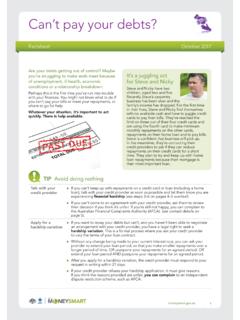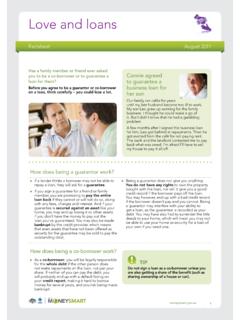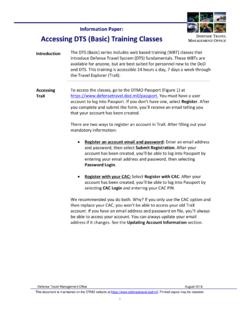Transcription of Dealing with debt collectors - Home | ASIC's …
1 Dealing with debt collectorsYour rights and responsibilities2 Dealing with debt collectorsAbout this bookletThis booklet helps you understand: Xwhat your legal rights and responsibilities are if you owe a debt Xwhere you can get help to work out your budget, negotiate a repayment plan, apply for hardship and better understand your financial and legal options Xwhat to do if a debt collector contacts you Xwhat debt collectors should not do and what you can do if you have been treated unfairly Xhow to dispute a debt . About ASICThe Australian Securities and Investments Commission (ASIC) regulates financial services and financial products. ASIC s MoneySmart website helps you make smart choices about your personal finances. It offers calculators and tips to give you fast answers to your money questions.
2 Visit or call ASIC on 1300 300 the ACCCThe Australian Competition and Consumer Commission (ACCC) is the general competition and consumer protection regulator and is responsible for regulation of goods and services generally. Visit the ACCC s website at or call the ACCC s Infocentre on 1300 302 collection guidelineThe ACCC and ASIC have produced the debt Collection Guideline for collectors and Creditors to assist creditors, collectors and debtors to understand their rights and obligations, and to ensure that debt collection activity is consistent with consumer protection laws. You can access the publication at and Having trouble with debt ? 4 What to do when a debt collector contacts you 6 How and when debt collectors can contact you 7 Unacceptable behaviour by debt collectors 10 Disputing a debt 12 Negotiating a repayment plan 15 Are you being taken to court?
3 17 Help and advice about your debts 184 Dealing with debt collectorsHaving trouble with debt ?People can get into debt for many reasons, including losing a job, divorce or separation, getting sick or having an accident. Whatever your situation, if you are struggling to repay your debts, don t be embarrassed to get you sign the loan or credit contract you make a legal promise to pay back the money that you borrow or pay for the service you sign up for within the agreed time frames. So you should do the best you can to pay the money you owe unless you dispute the debt . Here s what you can do to get back on track: XContact your credit provider - If you can t keep up with payments, talk to your credit provider straight away to discuss a repayment plan. Be realistic about what you can pay and be honest about your situation.
4 Remember to keep a record of these discussions. XApply for a hardship variation - Tell your credit provider that you are experiencing financial hardship and why. In the meantime, keep paying as much as you can afford. has details on how to apply for a hardship variation. XTalk to a financial counsellor Financial counsellors provide information and support to people with money problems. They may also negotiate with your creditors on your behalf. XGet free legal help Community legal centres and Legal Aid agencies offer free legal advice in every state and pages 18 and 20 for financial counselling and legal help contacts. 5 Case study: Steve struggles to pay his credit card debt Steve was made redundant. He started looking for work straight away but after 4 months he was still unemployed.
5 When his savings were gone, Steve started juggling credit cards to pay his bills and mortgage. Steve then took on some part-time work and was confident he would find a full time job soon. He contacted his credit card company and told them about his situation. The company agreed to temporarily reduce his repayments. This meant Steve was able to afford the minimum monthly payments and avoided paying late billsIf you re having trouble paying your energy, water or telecommunications bill you can ask to access a retailer s hardship program. You can do this either over the phone or in available may include: Xtailored payment plans based on your ability to pay Xwaiving late fees Xinformation to help reduce your bills (if relevant) Xidentifying government concession and rebate programs Xreviewing your contract to make sure it meets your needs (if relevant).
6 If you can t agree with your utility provider, you can lodge a dispute with an external dispute resolution scheme. See page 21 for contact details. 6 Dealing with debt collectorsWhat to do when a debt collector contacts you If you fall behind on your loan, credit card or utility bills and don t contact your provider or respond to them, a debt collector may contact you. A debt collector could be the original credit or service provider collecting the debt themselves or a debt collection agency acting on the creditor s behalf. Sometimes debts are sold and the debt buyer is the one doing the you should doIf a debt collector contacts you, you should be cooperative but you should also expect to be treated in a professional way. You should also: Xbe honest about your financial position, including other debts Xreturn calls or respond to correspondence promptly Xagree to a repayment arrangement if you can afford it (see page 15 for more information) Xtell the debt collector when your contact details (including your address) change.
7 If you are concerned about the collector s conduct, you can complain. See pages 10-11 for examples of unacceptable behaviour by a debt collector and information about making a Are you being taken to court?If you receive notice that you are being taken to court, get free legal advice about your options as soon as possible. See page 20 for contact details. 7 How and when debt collectors can contact you debt collectors must have a good reason to contact you and should take into account your circumstances and any reasonable requests about how and when you can be you request or agree otherwise, contact should be limited to:In writing or by phoneFace to faceNational public holidaysNo more than 3 times per week or 10 times per monthWeekdays by phone - only between am - 9 pmWeekends by phone - only between 9 am - 9 pmNo more than once a monthWeekdays and weekends - only between 9 am - 9 pmShould only visit your home if there is no other way to contact youNo contact should be madeSmart tipKeep a record of any contact Make sure you keep accurate, complete and up-to-date records of all communication you have with a debt collector .
8 This may include notes of telephone conversations or face-to-face with debt collectorsWays debt collectors can contact youDebt collectors can contact you in a variety of ways, for example, via phone, letter, email, social media or by visiting you in person; however they must respect your right to privacy at all times. By law, a debt collector cannot reveal that they are a debt collector or provide information about your financial situation to another person without your media and emailIf a debt collector uses email, social media or similar technology to contact you about a debt you owe, they must be reasonably sure that the account is not shared with another person and that their message cannot be viewed by anyone except visitsThere is no need for a debt collector to visit you in person if repayment arrangements can be worked out over the phone or by letter or may be necessary for a debt collector to visit you if you have not responded to other attempts to contact you or if your identity or location is in doubt.
9 If face-to-face contact is necessary, the debt collector should visit you at home during the hours set out in the table on page 7. Visiting you at work should be the last option. Rules on face-to-face visitsIf a debt collector visits you in person, they must: Xleave immediately if you ask them to Xtreat your family and any third parties with courtesy and respect Xrespect your right to privacy in front of family members and third parties Xnot stay near your home for an extended period or engage in any other conduct that suggests your house is under surveillance Xnot suggest or imply that any third party is liable for the debt when this is untrue Xnot talk to your child (under the age of 18) about the debt (unless you allow this or the child is willing and able to act as a translator or intermediary) Xnot embarrass or distress you or any third party 9 debt collectors must have a good reason to contact youDebt collectors should only contact you when it is necessary.
10 Here are some reasons you can be and payments XTo provide information about your account XTo make a demand for paymentWhere a payment arrangement is in place: Xto offer to settle your account or make alternative payment arrangements Xto review existing payment arrangements after an agreed XTo explain the consequences of you not paying, including any legal action the collector or creditor can take. XTo explain any restrictions to your utilities (for example, disconnection of your electricity or gas supply or restriction of your water supply).Mortgaged goods XTo inspect or recover mortgaged goods (if they have a right to do so).Get explanations XTo find out why you have not responded to attempts to contact you (if this is the case). XTo find out why you have not kept to an agreed repayment plan (if this is the case).














